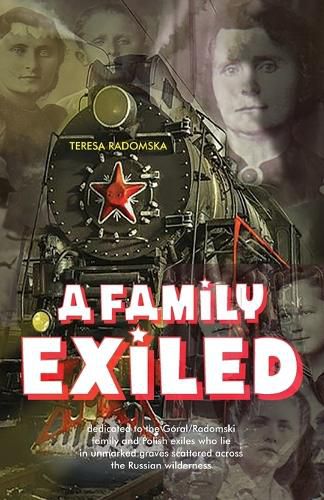Readings Newsletter
Become a Readings Member to make your shopping experience even easier.
Sign in or sign up for free!
You’re not far away from qualifying for FREE standard shipping within Australia
You’ve qualified for FREE standard shipping within Australia
The cart is loading…






This title is printed to order. This book may have been self-published. If so, we cannot guarantee the quality of the content. In the main most books will have gone through the editing process however some may not. We therefore suggest that you be aware of this before ordering this book. If in doubt check either the author or publisher’s details as we are unable to accept any returns unless they are faulty. Please contact us if you have any questions.
This is the story of a family exiled in 1940 to the Arkhangelsk Oblast, a most remote region of Russia. It's a story of courage and resilience, of my family who survived the most desperate conditions in the Russian labour camps, Poldniewica, Derawelka and Duraszewo. Stalin's first target on entering Polish soil on 17th September 1939 was to crush the Eastern Borderland settlers in an act of revenge. He had not forgotten the defeat of the 1919-21 Polish-Russian war and he considered the Polish military settlers living in the Kresy as 'enemies of the state.' Two of these 'enemies of the state' were my grandfather Adam Goral and great-uncle Walery Radomski, men of quiet courage and bravery, and they and their families paid the price. There was no room for this 'clique' in the Soviet order and the Russian Militia were waiting to act. With little warning on the fateful night of 10th February 1940, the NKVD - forerunner to the KGB - entered their homes and at gunpoint told them they were 'a threat to public order' and they forcibly packed the family into cattle wagons. It would be a journey of over 2000 kilometres and three weeks of misery and fear in temperatures of minus 25. Life in the labour camps was hell. Surrounded by vast forests and extreme climate, there was no escape. They were starved, mistreated, and almost worked to death until the 'amnesty' of 1941 [Polish-Russian pact]. They had barely survived and then faced a journey of escape through the Ural Mountains, the Kurgistan Steppes, Kazakhstan, Uzbekistan and finally to safety in Pahlevi in Persia [Iran] in 1942. Journeys that amounted to thousands of kilometres and many months. Their unbelievable determination had seen them to freedom. There was sadness, recovery and upheaval to deal with - they had survived when many thousands of their exiled countrymen did not. My family did not return to Poland after the war; 'enemies of the state' faced imprisonment or worse. They eventually made their homes in England in peace and safety. Stalin did not destroy their spirit: my mother Alicja is 98; she and her family survived, and as a child of Sybiraks, I am proud to tell their story.
$9.00 standard shipping within Australia
FREE standard shipping within Australia for orders over $100.00
Express & International shipping calculated at checkout
This title is printed to order. This book may have been self-published. If so, we cannot guarantee the quality of the content. In the main most books will have gone through the editing process however some may not. We therefore suggest that you be aware of this before ordering this book. If in doubt check either the author or publisher’s details as we are unable to accept any returns unless they are faulty. Please contact us if you have any questions.
This is the story of a family exiled in 1940 to the Arkhangelsk Oblast, a most remote region of Russia. It's a story of courage and resilience, of my family who survived the most desperate conditions in the Russian labour camps, Poldniewica, Derawelka and Duraszewo. Stalin's first target on entering Polish soil on 17th September 1939 was to crush the Eastern Borderland settlers in an act of revenge. He had not forgotten the defeat of the 1919-21 Polish-Russian war and he considered the Polish military settlers living in the Kresy as 'enemies of the state.' Two of these 'enemies of the state' were my grandfather Adam Goral and great-uncle Walery Radomski, men of quiet courage and bravery, and they and their families paid the price. There was no room for this 'clique' in the Soviet order and the Russian Militia were waiting to act. With little warning on the fateful night of 10th February 1940, the NKVD - forerunner to the KGB - entered their homes and at gunpoint told them they were 'a threat to public order' and they forcibly packed the family into cattle wagons. It would be a journey of over 2000 kilometres and three weeks of misery and fear in temperatures of minus 25. Life in the labour camps was hell. Surrounded by vast forests and extreme climate, there was no escape. They were starved, mistreated, and almost worked to death until the 'amnesty' of 1941 [Polish-Russian pact]. They had barely survived and then faced a journey of escape through the Ural Mountains, the Kurgistan Steppes, Kazakhstan, Uzbekistan and finally to safety in Pahlevi in Persia [Iran] in 1942. Journeys that amounted to thousands of kilometres and many months. Their unbelievable determination had seen them to freedom. There was sadness, recovery and upheaval to deal with - they had survived when many thousands of their exiled countrymen did not. My family did not return to Poland after the war; 'enemies of the state' faced imprisonment or worse. They eventually made their homes in England in peace and safety. Stalin did not destroy their spirit: my mother Alicja is 98; she and her family survived, and as a child of Sybiraks, I am proud to tell their story.